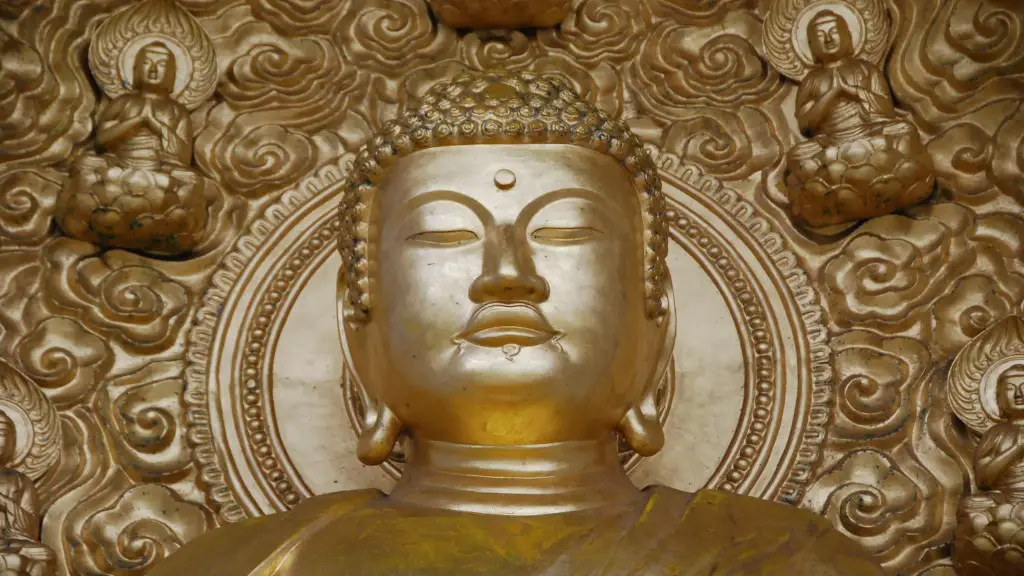Karma is a central concept in Hinduism and Buddhism. It is the law of cause and effect, whereby good deeds lead to good results and bad deeds lead to bad results. Karma is often seen as a kind of spiritual currency that determines a person’s destiny.
In both Hinduism and Buddhism, karma is the law of cause and effect. Every action has a consequence, and good deeds lead to positive consequences while bad deeds lead to negative consequences. People are responsible for their own actions, and they can create their own destiny through their actions.
What is karma according to Buddhism?
In the Buddhist tradition, karma refers to action driven by intention (cetanā). Those intentions are considered to be the determining factor in the kind of rebirth in samsara, the cycle of rebirth.
Karma is the cycle of cause and effect in Hindu, Jain, Sikh, and Buddhist philosophies. Like causes produce similar effects. For instance, right actions produce good results while wrong actions produce bad ones.
Is karma part of Hinduism or Buddhism
Karma is often spoken of as the law of cause and effect, whereby good deeds lead to good outcomes and bad deeds lead to bad outcomes. In Indian religions, karma is often seen as a force that determines the future of a person, often in terms of their next incarnation.
Many Hindus believe in the concept of reincarnation, whereby a person’s soul is reborn into another body after their death. The soul carries with it the karma from the previous life, which will determine the circumstances of the new life. For example, a person who has done good deeds in their previous life may be born into a wealthy family, while a person who has done bad deeds may be born into a poor family.
The concept of karma is also found in Buddhism, where it is seen as a way of explaining the suffering of humans. Buddhists believe that we experience suffering because of the bad karma that we have accumulated in our previous lives. We can only escape from suffering by doing good deeds in this life, which will lead to good karma and a better rebirth.
The Jain religion also believes in the concept of karma, and sees it as a way of explaining the cycle of birth and death. Jains believe that our soul is reborn into another body
Buddhism and Hinduism share a lot of common ground when it comes to key concepts like karma, dharma, moksha and reincarnation. However, they also differ in some important ways – most notably, Buddhism rejects the authority of Hindu priests, the importance of formal rituals, and the whole idea of the caste system. For Buddhists, the path to enlightenment comes through meditation and mindfulness, rather than through following rules and regulations.
What is an example of karma in Buddhism?
Even an enlightened one is not exempt from the effects of past karma. This story tells that the Buddha’s cousin tried to kill him by dropping a boulder on him. Although the attempt failed, the Buddha’s foot was injured. He explained that this was karmic retribution for trying to kill his step-brother in a previous life.
Karma is a central concept in Hinduism, and it is often described as the principle of cause and effect. Hinduism teaches that our actions have consequences, both in this life and in future lives. This principle is often referred to as the law of karma.
What is an example of karma in Hinduism?
There is a belief among some Hindus that a good dog may become a human in the next life, whereas a bad dog may become a bird or insect. The reasoning behind this belief is that the soul passing through lower species doesn’t create any new karma. He only works off the karmic reactions generated whilst in the human form and gradually rises towards another human birth. This belief provides some explanation for suffering, as Hindus blame karma for the misfortunes that befall people.
Karma is often described as the “universal law of cause and effect”. It is the idea that our actions have consequences, and that these consequences will come back to us in some way. There are three main types of karma: sanchita, prarabdha, and agami.
Sanchita karma is the karma that we have accumulated over our lifetime. It is the latent karma that is waiting to be expressed. This karma is often seen as the “cause” of our current situation.
Prarabdha karma is the karma that is currently being expressed in our life. It is the karma that is causing our present circumstances. This karma is often seen as the “effect” of our past actions.
Agami karma is the karma that we are creating in the present moment. It is the karma that will come back to us in the future. This karma is often seen as the “cause” of our future circumstances.
What is an example of karma
This is an example of good karma. The individual’s positive actions (putting money in the church collection plate) led to a positive consequence (finding money at home).
Buddhism is a religion based on the teachings of Siddhartha Gautama. The main principles of Buddhism are karma, rebirth, and impermanence.
Karma is the belief that our actions have consequences, both in this life and in future lives. Rebirth is the belief that after we die, we are reborn into another body. Impermanence is the belief that nothing in life is permanent.
What are the 4 types of karma Buddhism?
The Shrimad Bhagavad Gita explains four types of karma: Sanchita Karma, Agami Karma, Prarabdha Karma, and Kriyamana Karma.
Sanchita Karma is the accumulated karma from our past lives that is waiting to be experienced. This karma is often referred to as our “past life karma.”
Agami Karma is the karma we are currently creating through our thoughts, words, and actions. This is the karma that we are responsible for in this lifetime.
Prarabdha Karma is the karma that is currently being experienced in our current lifetime. This karma is often referred to as our “present life karma.”
Kriyamana Karma is the karma we are currently creating through our thoughts, words, and actions. This karma will determine our future experiences.
Yes, everything happens for a reason. And that reason is because of the karmic significance that is attached to it. Whether you believe in karma or not, it is still a force that governs your life. You create your own karma through your thoughts, words, and actions. And as you sow, so shall you reap. What goes around, comes around.
What do Buddhism and Hinduism have in common
Hinduism and Buddhism both accept the law of Karma, Dharma, and Moksha and believed in a cycle of rebirth. Hinduism and Buddhism both believe in the existence of several hells and heavens or higher and lower worlds. The founders of Hinduism and Buddhism are both unlike most major religions.
Hindus believe in the importance of the observation of appropriate behavior, including numerous rituals, and the ultimate goal of moksha. Moksha is the ultimate spiritual goal of Hinduism and is the release from the endless cycle of birth, death and rebirth. In order to pursue moksha, Hindus must follow the path of Dharma, which is the path of right action.
What are five similarities between Buddhism and Hinduism?
Hinduism is one of the oldest religions in the world with a history that can be traced back to over 5,000 years ago. Buddhism, on the other hand, is a relatively new religion that was founded by Gautama Buddha in the 6th century BCE. Despite their different origins, there are numerous similarities between Hinduism and Buddhism. Both religions believe in the concept of karma, whereby good deeds lead to positive outcomes and bad deeds lead to negative outcomes. Both religions also believe in the cycle of reincarnation, or samsara, and the importance of living a morally upright life, or dharma. Additionally, both Hindus and Buddhists practice meditation, yoga, and use mantra as a means of spiritual development. Although there are many similarities between Hinduism and Buddhism, there are also some important differences. For example, whereas Hinduism is not founded by a single person, Buddhism is founded by Gautama Buddha. Additionally, Buddhism does not believe in the caste system that is central to Hinduism.
Karma is often used to refer to the idea of predestination or predetermination – the idea that our future is determined by the choices we make in the past. Karma can also be used to refer to the idea of luck or fate – the idea that some things are just meant to be, and there’s nothing we can do to change it.
What is a good quote about karma
How you react to the way people treat you is your own karma. You are not punished for the bad things people do to you, but by your reactions to them. Sometimes it’s just your turn to be unhappy, but nobody deserves to be miserable all the time. By your actions, both good and bad, you create your future.
Karma is a complex topic with a long history. In short, it is the belief that our actions and intentions have an impact on our future lives. The energy we put out into the world now will come back to us later. This can be a good or bad thing, depending on our actions and intentions.
Karma is often thought of as a type of cause and effect. What we do now will come back to us later, whether that is good or bad. This can be a powerful motivator to live a good life and do good deeds. It is also a reminder that we are all connected and that our actions have consequences.
While karma is often seen as a spiritual belief, it is also a practical way to view the world. It can help us to be more mindful of our actions and the impact they have on ourselves and others. It is a reminder that we are all interconnected and that our actions have consequences. When we live with this in mind, it can help us to make better choices in our lives.
Conclusion
In Hinduism and Buddhism, karma is the belief that a person’s actions have an affect on their future. Good deeds will lead to a good future, while bad deeds will lead to a bad future. This belief is based on the idea of cause and effect, and it is thought that our actions in this life determine our destiny in the next life.
Karma is an important concept in Hinduism and Buddhism. It is the belief that good deeds will be rewarded with good fortune and bad deeds will be punished. This cycle of cause and effect is thought to keep people in balance and ensure that they live a life in accordance with the law of karma.




